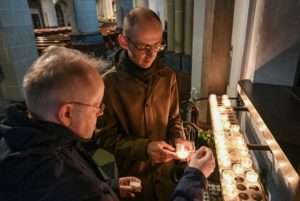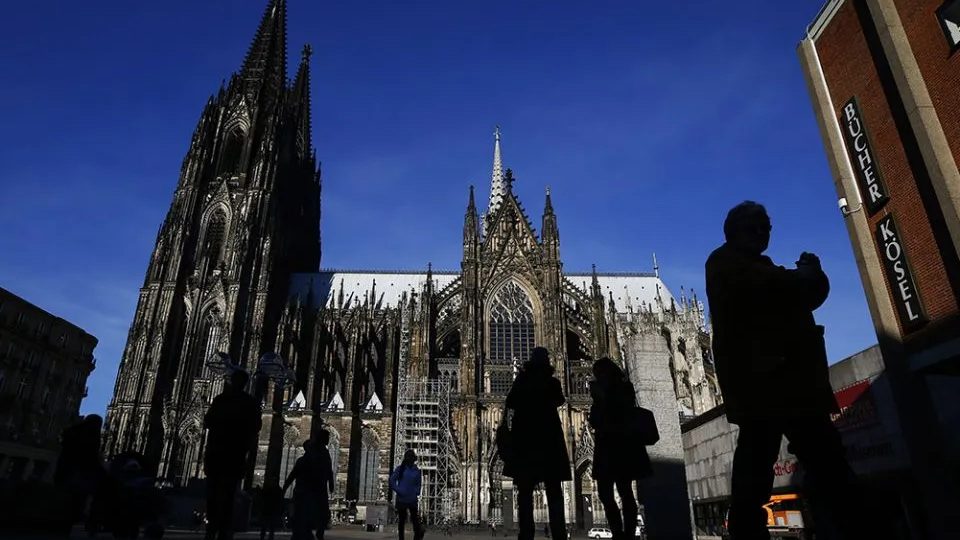Several hundred people gathered Sept. 20 near the cathedral in Cologne, Germany, to hold a blessing service that catered especially to people who identify as "LGBTQ+" and people who remarried after a divorce, while those protesting the service prayed the rosary next to it.
Some participants waved rainbow flags and held up placards with statements such as "Love wins" or "Blessings for all" on the square in front of Cologne Central Station in the shadow of the world-famous twin-towered cathedral.
A carpet of flowers in the shape of a heart laid in front of an altar. According to the police, about 600 people attended the service, held under the motto "All you need is love."
It was conducted by 19 Catholic priests and pastoral ministers, 16 of whom were from the Archdiocese of Cologne. In addition, a choir of 120 singers in colorful sweaters provided musical accompaniment to the service.
The event was held in reaction to the reprimand of a priest from the archdiocese who celebrated the first such service in the town of Mettmann in March.
Officials from the Cologne Archdiocese, which includes Mettmann, had reprimanded the priest afterward and stressed that the Vatican doesn't allow blessings of same-sex couples, German news agency dpa reported, according to The Associated Press.
According to Catholic teaching, homosexual couples and remarried divorcees are living in sin. The celebration in Cologne was timed to coincide with the anniversary of Cardinal Rainer Maria Woelki's installation as archbishop in Cologne Sept. 20, 2014, and seen as an event in defiance of the German cardinal-archbishop.
Some 20 people gathered on the sidelines of the service and held a counter-protest by praying the rosary, a demonstration called for by the German Society for the Protection of Tradition, Family and Property. They held up a banner that said, "Let's stay Catholic." They were in turn opposed by 70 to 80 members of the Cologne Antifa movement of left-wing activists. The police kept the groups apart.
A gay couple that attended the service said they had been touched by the event. "It was a very profound moment to receive the church's encouragement from church ministers," one of them said.
The German government's LGBTQ+ commissioner called the service an important symbol for the demand that the Catholic Church recognize and accept same-sex couples, according to AP.
"It is mainly thanks to the church's grassroots that the church is opening up more and more," Sven Lehmann said, according to dpa. "Archbishop Woelki and the Vatican, on the other hand, are light years behind social reality," he added.
Cardinal Woelki recently expressed understanding for same-sex couples who felt a deep desire for a church blessing. However, he added that it was a question that first had to be clarified at the level of the universal church. In mid-March, a majority of participants in the "Synodal Path" -- the reform consultations of the Catholic Church in Germany -- had voted in favor of allowing blessing ceremonies for such couples.

The Germans' synodal idea to establish a permanent decision-making body of bishops and laypeople also was rebuked by three cardinals at the Vatican in January, who said Germany's bishops do not have the authority to establish such body, aimed at making decisions on reforms discussed in the Synodal Path.
In their message to the president of the German bishops' conference, Bishop Georg Bätzing of Limburg, the Vatican officials addressed questions surrounding the establishment of a "Synodal Council" to advise the church in Germany "on major developments in the church and in society" and "take fundamental decisions" on matters that go beyond the diocesan level.
"We wish to make it clear that neither the Synodal (Path), nor any body established by it, nor any episcopal conference has the competence to establish the 'Synodal Council' at the national, diocesan or parish level," said the letter signed by Cardinal Pietro Parolin, Vatican secretary of state, Cardinal Luis Ladaria, prefect of the Dicastery for the Doctrine of the Faith, and Cardinal Marc Ouellet, then prefect of the Dicastery for Bishops.
The three cardinals said Pope Francis approved the letter.
Meanwhile, Bishop Bätzing has said he disagrees with the Vatican's ban on the ordination of homosexual men to the priesthood.
The ban has led to homosexuality being regarded as taboo and hidden, Bishop Bätzing said at Deutschlandfunk radio Sept. 20. The Vatican should drop this rule, he said.
The current Vatican guidelines, "The Gift of the Priestly Vocation," published in December 2016 state that "practicing homosexuals" and men who have "deeply rooted homosexual tendencies" shouldn't be admitted into Catholic seminaries.
During the Synodal Path reform consultations on the future of the Catholic Church in Germany, Bishop Bätzing had repeatedly spoken out in favor of reforms in Catholic sexual morality, including a general reassessment of homosexuality.
Such a stance has made waves in neighboring Poland where the president of the bishops' conference, Archbishop Stanislaw Gadecki of Poznan, has intensified his criticism of the Catholic Church in Germany, saying it is going through its greatest crisis since the Reformation.
"There is a great danger that a misunderstood reform of Christianity will once again lead to a division of the church that will spread to neighboring countries," Archbishop Gadecki said in an interview with the Catholic weekly newspaper Die Tagespost Sept. 21.
In February, Archbishop Gadecki wrote an open letter to the president of the German bishops' conference, expressing "deep concern" about the Synodal Path reform consultations in Germany. He said the letter was written because of the common responsibility for the universal church. There had been no intention to make decisions on behalf of other bishops, he said, adding he had only wanted to point out risks "which can bring about wrong pastoral decisions and doctrinal confusion." The letter remained relevant, he added.
The church in Germany has been going through tectonic shifts in recent years, with more than six out of 10 people in Germany saying they never attended a religious service, according to a survey published Sept. 21.
While 64% of respondents said they never went to a church, mosque or synagogue for religious celebrations -- according to the survey conducted by the research and data analytics firm YouGov for the Catholic site katholisch.de -- 6% said they went to church at least once a week and 5% once a month.
The survey surprisingly did not confirm the commonly held view that most churchgoers are elderly. Among the respondents over 55, the proportion of those who never enter a place of worship was highest at 74%.
A closer look at German faithful reveals that Muslims are much more likely to go to mosques than Christians to church: only 22%of Muslims said they never went to the mosque. Among Catholics, it was 49%, and among members of the Protestant Church, 53%.
Among the Catholic faithful in Germany, regular attendance at church services is more firmly anchored than among Protestants: 10% of Catholics and 4% of Protestants said they went to church at least once a week. Among Muslims, 17% said they went to the mosque at least once a week.

